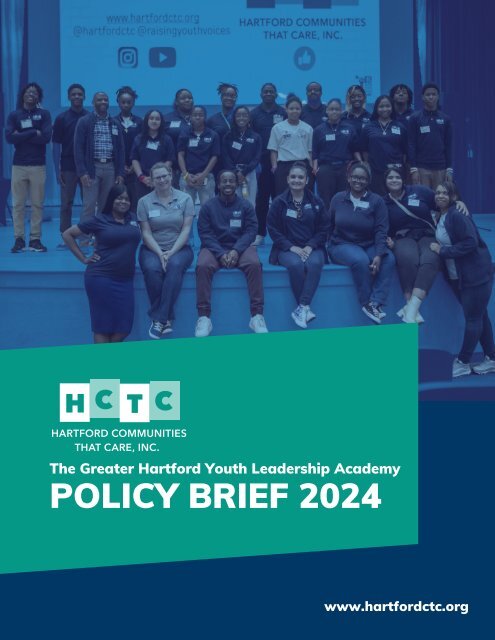The Greater Hartford Youth Leadership Academy: POLICY BRIEF 2024
Create successful ePaper yourself
Turn your PDF publications into a flip-book with our unique Google optimized e-Paper software.
<strong>The</strong> <strong>Greater</strong> <strong>Hartford</strong> <strong>Youth</strong> <strong>Leadership</strong> <strong>Academy</strong><br />
<strong>POLICY</strong> <strong>BRIEF</strong> <strong>2024</strong><br />
www.hartfordctc.org
2<br />
OVERVIEW<br />
At our Sixth Annual Raising <strong>Youth</strong> Voices Summit May 4, <strong>2024</strong>, youth<br />
teams convened to confront some of the most serious problems in their<br />
midst, interact with adult leaders, and recommend positive steps – even<br />
possible solutions. This Policy Brief provides a sampling of program<br />
highlights and invites your views.
GYHLA <strong>POLICY</strong> <strong>BRIEF</strong> <strong>2024</strong><br />
3<br />
What Constitutes<br />
<strong>Leadership</strong>?<br />
Drawing upon the experiences and wisdom of past guest speakers (including former<br />
State Treasurer Shawn Wooden and Secretary of the State Stephanie Thomas), the<br />
current youth cohort has been defining the drivers of effective leadership in personal<br />
conversations, including those this year with Congressman John Larson and former<br />
State Commissioner of Mental Health and Addiction Services Miriam Delphin-Rittmon<br />
(now Assistant Secretary of the U.S. Substance Abuse and Mental Health Services<br />
Administration). To further these explorations, the <strong>2024</strong> Summit featured remarks by:<br />
<strong>The</strong> Honorable Vanessa Roberts Avery, U.S. Attorney for the District<br />
of Connecticut. Having once been an extremely shy child, she advised,<br />
“Everyone has the capacity to lead” … and yet not everyone has to be<br />
on the mic! Reflecting that leadership skills will carry you throughout<br />
your life, she offered three “nuggets” as practices distinguishing the<br />
best leaders: knowing how to listen and learn; building strong teams<br />
around you; and not being afraid to push yourself.<br />
UConn Professor Dr. Jeffrey O.G. Ogbar, Professor of History and<br />
Founding Director of the Center for the Study of Popular Music at<br />
UConn, earned his BA in History from Morehouse College in Atlanta<br />
(and an MA and Ph.D. in U.S. History from Indiana University). After<br />
publishing on subjects as varied as the New Negro Renaissance, mass<br />
incarceration, and hip-hop, he just wrote America's Black Capital: How<br />
African Americans Remade Atlanta in the Shadow of the Confederacy,<br />
detailing the heroism of that city’s leaders. Dr. Ogbar emphasized the<br />
importance of leadership as serving the people – it’s not just about<br />
aggrandizement and ego, he advised.
GYHLA <strong>POLICY</strong> <strong>BRIEF</strong> <strong>2024</strong><br />
4<br />
Can We Get Smarter<br />
with Smart Phones?<br />
Taking on the question, What impact does<br />
social media have on youth?<br />
<strong>The</strong> Summit youth panel featured representatives from HCTC’s youth academy, <strong>The</strong> <strong>Greater</strong><br />
<strong>Hartford</strong> Kappa League, Black Girls Achieve, and the Blue Hills Civic Association’s <strong>Youth</strong><br />
Organizing for Social Justice. <strong>The</strong> panelists widely agreed that the dopamine-motivated<br />
reflex to pull out your phone can be overwhelming – and still, it can be difficult to experience<br />
social media without facing negative experiences like bullying or the inability to focus. At the<br />
same time, a large world of beneficial possibilities is available. With these considerations in<br />
mind, the panelists offered several suggestions for children and parents alike:<br />
Stay off social media when you’re around other people; your smartphone shouldn’t be<br />
who you interact with then!<br />
For parents or teachers: Don’t just take phones away – instead, teach children how to<br />
use them properly.<br />
Advocate the setting of screen time limits – and treat phone use as a privilege.<br />
Keep accounts private, and help children differentiate social media from reality (which<br />
can become confusing when, for example, a random criticism comes in from California!)
GYHLA <strong>POLICY</strong> <strong>BRIEF</strong> <strong>2024</strong><br />
5<br />
Examining Root Causes<br />
and Local Conditions<br />
Whether standing with 800,000 March For Our Lives protesters at the U.S. Capitol<br />
or conducting interviews with experts on foster care and child safety, HCTC youth<br />
leaders have relied on a problem-solving process that requires each team to define<br />
a problem, gather relevant data to identify its root causes and local conditions and<br />
develop strategies designed to alleviate that problem. This year’s Work Groups<br />
centered their attention on Equalizing Education,
GYHLA <strong>POLICY</strong> <strong>BRIEF</strong> <strong>2024</strong><br />
6<br />
What Would Help Equalize<br />
Education?<br />
GHYLA Team: Breanna Brown, Shenia Chantiloupe,<br />
Emmanuel Bailey, Kaiu Hercules<br />
Equalizing education requires addressing<br />
inequities in course access, improving<br />
school environments, enhancing parentteacher<br />
communication, and providing<br />
emotional support.<br />
T<br />
hrough the lens of inequity, this Work Group<br />
focused on elementary, middle, and high school<br />
issues, citing the U.N.’s identification of inequity as<br />
the most serious problem in education worldwide,<br />
but predominant in the U.S. Differences in access<br />
to schooling crop up in absenteeism, which is<br />
related to negative school environments, and the<br />
weapons, drugs and negative behaviors brought<br />
into schools. Moreover, inequity also is seen in the<br />
comparatively smaller course offerings that limit<br />
the opportunities in adjacent school districts and<br />
even in neighboring schools within the same<br />
district.<br />
For example, for two of our team members<br />
attending nearby <strong>Hartford</strong> schools, one can obtain<br />
college credit and begin higher education in high<br />
school – but the other has no such opportunity.<br />
Pointing to the important parent-teacher<br />
relationship, the Work Group also maintained that<br />
some schools have insufficient communication<br />
with the parents of their students, which can leave<br />
families unaware of the resources for options such<br />
as college, trade school, apprenticeships, or job<br />
opportunities. This issue is further complicated by<br />
the fact that 23 percent of U.S. students speak<br />
English as a second language (ESL) while 79<br />
percent of teachers speak only one language.<br />
<strong>The</strong> Work Group examined the negative struggles<br />
of children in the early grades who are easily<br />
influenced by harmful behavior as well as the<br />
damaging environmental struggles of middle<br />
school students who encounter antisocial<br />
behavior, bullying, low self-esteem, and academic<br />
failure. Lack of tutoring help, emotional and<br />
mental health support, and after-school activities<br />
contribute to disengagement, the team found.<br />
State data on negative school incidents from<br />
2017-2023 show increases in cases of weapons,<br />
drugs, threatening behavior, and fighting.<br />
By high school, when students are venturing into<br />
adulthood, advanced classes, time management<br />
and responsibility are key to students’ molding<br />
and exploring their passions, some schools have<br />
fewer qualified or experienced teachers and lack<br />
requirements for a certain subject in school.<br />
Absenteeism is worsened when schools lack<br />
classes related to career interests – and when<br />
students work to support their households.
GYHLA <strong>POLICY</strong> <strong>BRIEF</strong> <strong>2024</strong><br />
7<br />
<strong>The</strong> Work Group’s recommendations<br />
for improving school climate include:<br />
Enhancing social-emotional learning<br />
Addressing the availability of weapons<br />
Improving the child-parent connection<br />
Making the school environment safe<br />
Offering Elementary-Middle School clubs/workshops<br />
and career-oriented courses in HS<br />
Providing more resources to single parents<br />
Moreover, with the <strong>Hartford</strong> Public Schools looking at<br />
cuts of 387 positions by June 30th due to the expiration<br />
of COVID-19 funds, the Work Group called for multiple<br />
sources of revenue to close the district’s deficit.
GYHLA <strong>POLICY</strong> <strong>BRIEF</strong> <strong>2024</strong><br />
8<br />
What Would Help Prevent<br />
Community Violence?<br />
Looking at community and home violence, this Work Group identified four<br />
root causes: Normalization of trauma; Lack of mentorship; Lack of<br />
resources; and Negative social norms.<br />
In response to these community and home<br />
violence issues, the team recommended afterschool<br />
programs that promote civil engagement<br />
and emotional awareness; more job opportunities<br />
throughout the community; teaching people how<br />
and why their actions have negative effects on<br />
others; and emphasizing the importance of<br />
having someone to look up to or to talk to.<br />
Taking a closer look at school violence, the team<br />
then considered social, community, and home<br />
factors that affect the school environment,<br />
observing that “kids in school find interest in<br />
fights, so they instigate problems that are easily<br />
avoidable.”<br />
As to social violence, after listing as root causes<br />
the Dissolution of Relationships between<br />
individuals; Lack of Communication; Troubled<br />
Adolescents; and the Breaking of Trust, the<br />
team urged emphasis on the importance of<br />
Emotional Intelligence (Emotional Quotient EQ)<br />
and the encouragement of Social Emotional<br />
Learning in schools – including implanting it as<br />
part of the curriculum.<br />
Here, the recommended solutions were peer<br />
mediation, leadership programs, and even town<br />
hall meetings as measures aimed at deescalating<br />
and resolving conflicts.<br />
Let Us Hear<br />
From You!<br />
Email us your thoughts:<br />
info@hartfordctc.org.<br />
Today we have local, state, and national efforts to prevent<br />
violence. We don’t have to wait for tragedies; we know enough<br />
to head them off. <strong>The</strong> developing concept of Community<br />
Violence Intervention (CVI) focuses on how to prevent violence<br />
from breaking out in the first place. Researchers refer to CVI as<br />
intervening “upstream,” long before the trauma in the<br />
emergency room. This means paying attention to housing and<br />
in access to jobs, health and mental health care, school<br />
offerings, and safe neighborhoods. Our <strong>2024</strong> youth summit<br />
recommendations remind us that positive change requires<br />
going beyond passive acceptance to walk the talk.
GYHLA <strong>POLICY</strong> <strong>BRIEF</strong> <strong>2024</strong><br />
9<br />
What Would Help Advance<br />
Mental Health and Wellness?<br />
This team’s overview of Mental Health defined it as “our social, emotional, and psychological<br />
well-being” and noted that related issues can arise from factors as varied as Life Experiences,<br />
Genetics, Brain Injuries, and Mother's Exposure to Chemicals. For its research, the team<br />
focused on the topics of School (depression and anxiety in teens); Social Media (the pros and<br />
cons); and Home (child neglect and lack of parental guidance).<br />
<strong>The</strong> team examined two<br />
factors that can affect<br />
mental health in school:<br />
Academic Pressure, which the team maintains is influenced by the lack<br />
of support from adults whom students need the most; lack of<br />
understanding of student lifestyles (the most common of which now is<br />
work); and parents’ pressuring their children to be the best. Data say<br />
50-75% of students report feeling stress over academics all the time.<br />
Peer Pressure, which involves the feeling of having to fit in with others;<br />
getting called out for not being like others; and caring more and more<br />
about what other people think about them. Data indicate that 55% of<br />
students report feeling stress due to the influences of peer pressure.<br />
Social Media, which can positively improve an individual’s self esteem,<br />
give people a sense of belonging, and encourage connection with<br />
others through different apps or websites, is a mix of pros and cons.<br />
<strong>The</strong> downside, according to data, is that 23% of Middle & High School<br />
students have experienced cyberbullying since 11-22-23, with 13.6% of<br />
cyberbullying victims in the U.S resorting to serious suicide attempts.<br />
Social media education, enforced age limits for social media apps, and<br />
promotion of parental guidance when children are introduced to the<br />
apps are potential solutions to these issues, the team recommended.
GYHLA <strong>POLICY</strong> <strong>BRIEF</strong> <strong>2024</strong><br />
10<br />
<strong>The</strong> Work Group’s recommendations<br />
for improving school climate include:<br />
Looking at data on the lack of parenting, characterized by unresponsiveness to a child’s<br />
needs, the team cited data that 1 in 7 children between 2020 and 2021 experienced abuse in the<br />
home – and 23% of children under the age of 18 live only with their mothers. Life circumstances,<br />
health issues, and poverty are considerable factors, as are the styles of parenting (authoritarian,<br />
authoritative, uninvolved, permissive), the team found. With 40% of children going without<br />
support from one or both parental guardians, the lack of parental support is a major issue – and it<br />
is associated with adult depression. Finally, the team examined the barriers presented by public,<br />
self, and institutional stigma – the negative attitudes that can combine with cultural and religious<br />
beliefs to keep people from finding help.<br />
Finding Solutions to Advance Mental Health and Wellness.<br />
<strong>The</strong> team offered two tiered recommendations:<br />
Personal: Meditation (reduces stress); Connecting with Others;<br />
Improving Restfulness; and <strong>The</strong>rapy.<br />
Communities: Substance Abuse and Mental Health Services (SAMHSA);<br />
and Community Connections.
2550 Main St, <strong>Hartford</strong>, CT 06120<br />
(860) 724-1223<br />
INFO@HARTFORDCTC.ORG<br />
WWW.HARTFORDCTC.ORG







